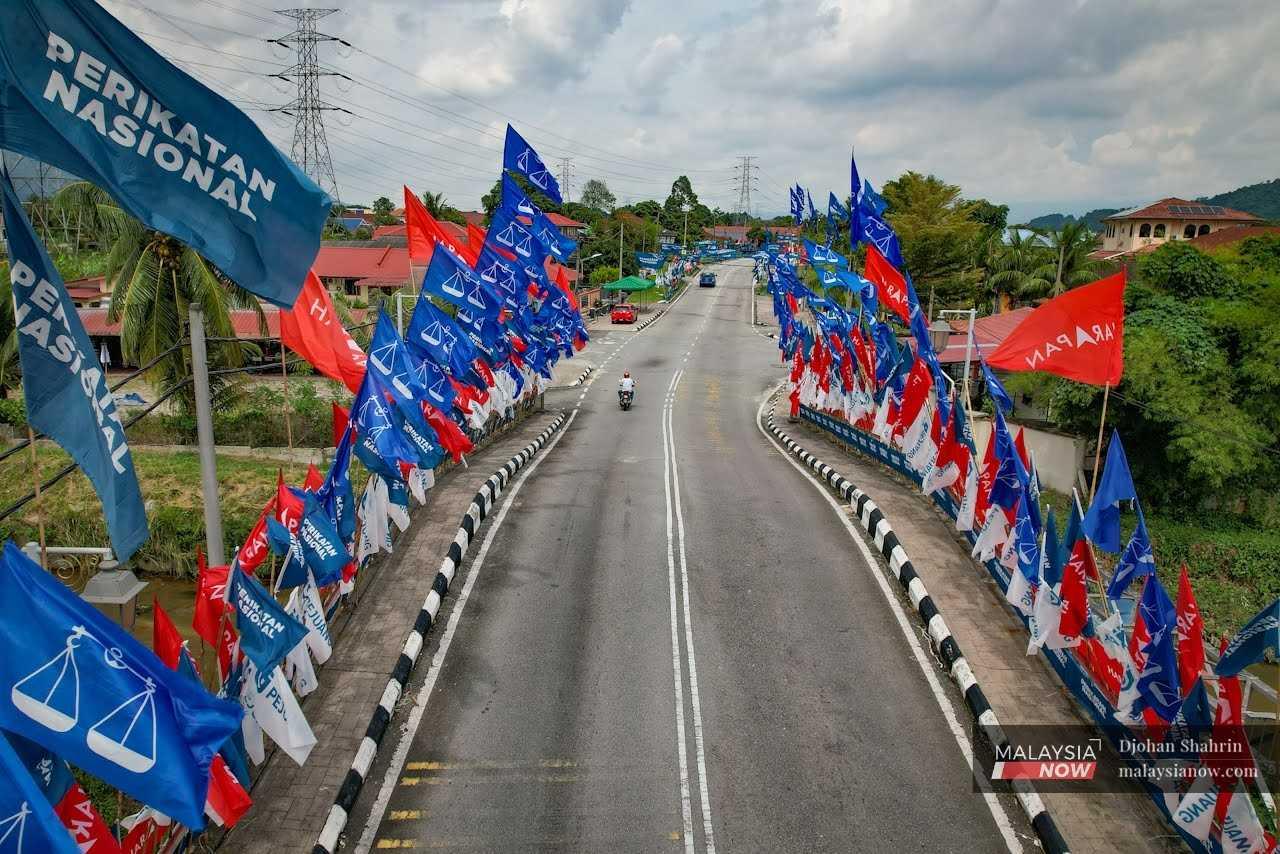Horse-trading the name of the post-election game
With three major coalitions in the fray, none of which is expected to win a majority on its own, any formation of a new government is likely to be determined through post-election bargaining.
Just In
More than 21 million voters are expected to head to the polls today after two weeks of campaigning which ended just before midnight last night.
Of these, 5.7 million aged 18 and above were automatically registered as voters while nearly 1.4 million or 6.58% are so-called Undi 18 voters, aged 18 to 21.
The snap polls were called after Prime Minister Ismail Sabri Yaakob came under pressure from the Umno court cluster led by their president Ahmad Zahid Hamidi to dissolve Parliament before the expiry of its term.
Ismail dissolved Parliament on Oct 10 despite warnings by the Malaysian Meteorological Department of bad weather due to the end-year transition to the northeast monsoon phase.
A number of localities have since struggled with floods, including Meru, Kapar, Dengkil and Kuala Selangor.
While nomination for the election was held on Nov 5, the campaign began in earnest long before.
Barisan Nasional (BN), which is hoping to ride on its success at the recent Melaka and Johor state elections, has been dogged by internal conflict among factions which saw several prominent individuals dropped as candidates for the polls.
The results of the election itself have proven difficult to predict, with many voters still undecided about who to support, even at the last minute.
This is due in part to the sheer number of parties contesting this election, including three major coalitions, all of whom are aiming to form the government on its own without working with other groups.
Apart from BN, Pakatan Harapan (PH) and Perikatan Nasional (PN) are also in the fray, and constitute the main players in the fight for 165 seats in the peninsula.
In Sabah and Sarawak, Gabungan Parti Sarawak (GPS) and Gabungan Rakyat Sabah (GRS) are expected to maintain the status quo.
This is the first election for PN since it was formed, comprising Bersatu, PAS, Gerakan and two Sabah-based parties.
PN is seen as an alternative for Malay voters who are in favour of neither BN nor PH.
In terms of seats, the competition is tight in a number of constituencies including Tambun in Perak, where PKR president Anwar Ibrahim is looking to topple the incumbent. Bersatu number two Ahmad Faizal Azumu.
Also in the limelight is the seat of Gombak, where the incumbent Mohamed Azmin Ali is clashing with his former protege, Selangor Menteri Besar Amirudin Shari in a five-way fight.
Rembau incumbent and health minister Khairy Jamaluddin, meanwhile, has been tasked with toppling PKR's stranglehold in Sungai Buloh.
Within BN itself, Khairy and Zahid have been exchanging friendly fire throughout the campaign, with the former openly stating his goal of one day becoming the prime minister.
Whether PH will be able to pull off a repeat of its historic success in 2018 remains to be seen, with only several thousand seen attending its "grand finale" in Gombak compared to the tens of thousands who came ahead of the 14th general election (GE14).
In general, the people have been preoccupied with other issues including the cost of living and the economy, which took a big hit from the Covid-19 pandemic.
Political fatigue has also been an issue, with three prime ministers changing hands over a period of two years.
Many voters have voiced a preference for local candidates whom they believe will do a better job of dealing with problems within the constituency.
Where the rural Malay vote will go this election is also anyone's guess. Non-Malay support, for the most part, is expected to go to PH.
At GE14, the so-called Malay tsunami, triggered by former prime minister Dr Mahathir Mohamad and his party at the time, Bersatu, succeeded in toppling the BN government for the first time since Malaysia's independence.
This was due to the number of parliamentary seats in rural areas including Felda settlements, which, at 155, constitute more than half of the total 222 seats in the Dewan Rakyat.
But changes in the country's political landscape since GE14 as well as the health crisis brought on by the pandemic have seen Malay voters in these areas becoming increasingly open to political demands, including in issues related to development, education, internet access, job opportunities, and infrastructure in village areas.
Given the cloud of war that continues to hang over the election, any formation of a new government is likely to be decided through horse-trading between coalitions, with GPS and GRS maintaining their role as kingmaker in determining which bloc finally occupies Putrajaya after the dust has settled.
Subscribe to our newsletter
To be updated with all the latest news and analyses daily.
